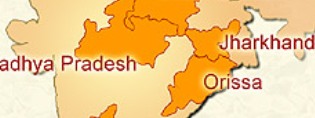India has a long history of Hindu-Muslim riots but little record of Hindu-Christian violence. Thus violence in Kandhamal and Mangalore would appear extraordinary. The devil lies in details, but the national media conveniently locates it in the RSS, VHP and the Bajrang Dal. Actually, it is evangelism that provokes a violent reaction from local people.
Evangelism, or bringing heathens to Christian faith, might sound a throwback to the colonial era, if not the Middle Ages. Yet we have to countenance it (like we have to countenance jihad, a 7th century Arabic concept) in the independent India of the 21st century. Money and flab, it is said, show even if you try to hide them. Just surf through television channels and you will find the evangelical flab. Let alone dedicated evangelical channels, evangelical capsules of Joyce Meyer and Paul Dinakaran occupy time slots on most private channels. No wonder this has come about in the last four years of the UPA government. How else could DD Punjabi/Jalandhar, DD NE/Guwahati or DD Malayalam — national carriers of a secular country — show explicit evangelical content by Joyce Meyer, neatly dubbed and subtitled in the language of those channels? What the MoU is between the soldiers of Christ and the I&B ministry of a "secular" government needs to be investigated.
The Church in India claims that the demographic share of Christians in India has declined to 2.5 per cent. Is such a vast telegospel project meant to serve the needs of this minuscule community? Census 2001, however, shows an abnormally steep rise in the Christian population in various states (Goa and Kerala are surprising exceptions) between 1991 and 2001.
The British rule was farthest from theocracy but it offered a certain leeway to evangelical clout. "In the 10 years, 1921-1931, the population of India has increased by 10 per cent; the Christian Church has increased by 32 per cent.
The Church has doubled its number in the 20th century. Christian work is being carried on in every province, and in almost all the larger Indian states," wrote Stephen Neill, warden of the Diocesan Theological College, Tinnevelly, in his 1936 book Builders of the Indian Church. But independent India has outdone it all. The Northeast, where evangelical penetration was least during British rule, has become almost wholly Christian during independent India.
Christian missionaries are viewed as people who have done wonderful work in the field of education, health and philology. Orientalist and humanist Reverend James Long (1814-1887) of Calcutta was such a revered name. But recently I was shocked to read in his book Handbook of Bengal Mission, (1948) in connection with the Church of England, what this illustrious scholar of Sanskrit, Bengali and Persian had to say on the Himalayas that Hindus view as the abode of gods: "Every valley has its spirit and every hill its demon, and the heaven-springing pinnacles of snow are tin; temples of gods of terror and vengeance, who must be appeased by painful pilgrimages… Many had recruited their exhausted spirits, reinvigorated their bodily powers by breathing the pure air of the rugged Himalaya fastnesses, and indulged their curiosity by penetrating into these magnificent regions; but few thought of the moral darkness and deformity that reign in those regions of natural light and beauty".
James Long's period, i.e. 19th century, was also the time when many non-evangelical Western Orientalists did great work to exhume India's heritage through philology, archaeology and numismatics. But James Long's evangelical streak exposes his essential antipathy to heathen India despite his excellent mannerism. If it had happened to Long, today's shortbrained evangelists would scarcely be immune. In the 19th century, the ecclesiastical career still attracted many brilliant minds in the West. But in the 21st century, when there are so many white-collar career opportunities, only those who can't make it elsewhere join the evangelical brigade. Today's evangelists are not qualified to join Microsoft, Intel or Nasa. It is only the Church, ironically built in the name of Nazarene, that seems flushed with money to offer them a career. Look at the Joshua Project (www.joshuaproject.net) that aims at "Christianisation of India".
The evangelists are playing a long-term chess game in India. How evangelists dupe people is exemplified by the story of Italian Robert di Nobili, who came to India in 1605. His story is related by Charles Henry Robinson, a top missionary, in his 1915 book History of Christian Missions. "Having determined to make himself an Indian, in order he might win the Indians, he adopted the dress and the sacred thread of a brahmin, and painted sandalwood on his fore head… He called himself a raja from Rome and eventually produced a new veda, which he himself had forged, in support of his teaching. He kept aloof from men belonging to low castes and only allowed the brahmins, or men of high caste, to have access to him. The principle which underlay his action was sanctioned by a papal bull in 1623 which declared that "out of compassion for human weakness, Nobili's converts are permitted to retain the plait of hair, the brahminical thread, the sandalwood sign on the forehead, and the customary ablutions of their caste". Christian missionaries turned their eyes to tribals and dalits only after they failed to cut much ice with the upper castes. Their love for India has proved to be more dangerous than their hate. India must wake up to these ecclesiastical commandos who make deception their chief weapon.
more
